Naturally, we concentrate on cleaning our underground vegetables so they are ready for ingestion when we harvest them. But this seemingly straightforward step can do much more than simply make our meals cleaner. When crops like carrots, potatoes, beets, or onions are harvested, they are taken out of the soil, where they frequently carry something unique: a wealth of helpful microorganisms clinging to their roots and the little dirt that remains on them. These microorganisms are not trash; they can help other plants in your garden grow and thrive. Effective use of these bacteria can improve soil health and make the soil more conducive to the growth of other crops.
Microbes’ Function in Soil Health
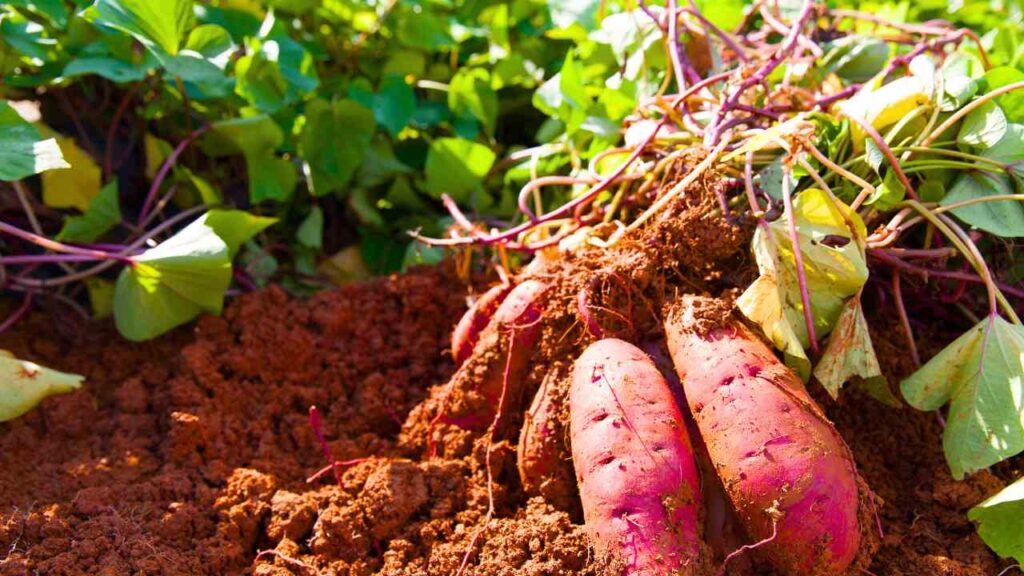
The soil that adheres to your picked vegetables is alive with life and not just dirt. It has a wide range of microorganisms, such as fungi, bacteria, and other helpful microbes, all of which are essential for maintaining the health of plants. By decomposing organic debris and increasing plant accessibility to nutrients, these bacteria contribute to better soil structure. To improve nutrient intake, they can also establish symbiotic partnerships with plant roots. Furthermore, by outcompeting pathogens for resources and space, these advantageous microorganisms might shield plants from dangerous ones. As a result, when you harvest and clean your vegetables, you’re not only getting rid of dirt; you’re also getting rid of a fantastic source of natural soil accelerators that can greatly improve your garden.
The Microbial Solution’s preparation
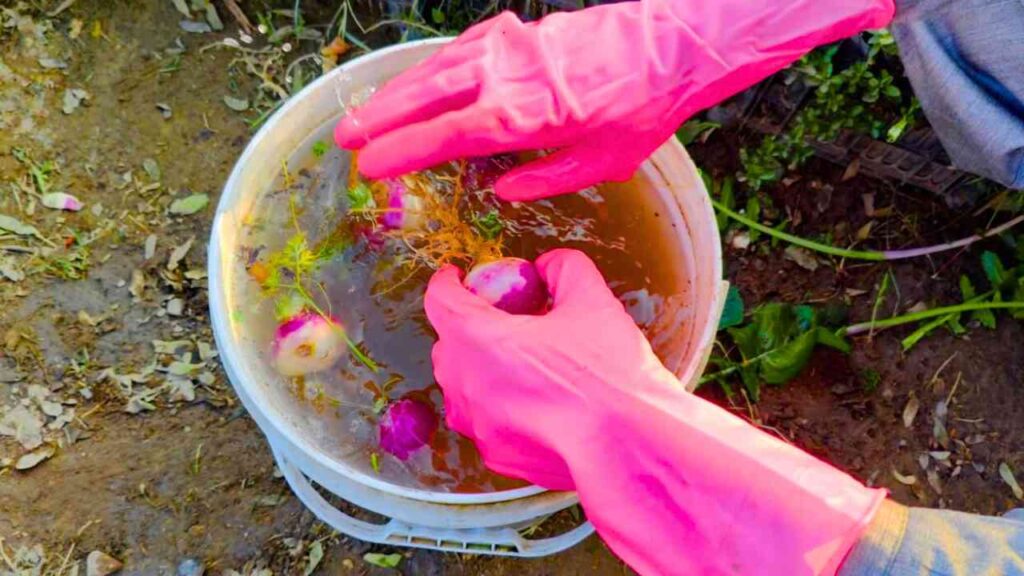
Why not use this step as a practical gardening opportunity rather than washing your veggies in the sink and wasting the helpful microbes? The soil that adheres to your vegetables can be used to make a nutrient-rich microbial solution for your plants. Fill a bucket with pure, unchlorinated water to start. Avoiding tap water is crucial because it frequently contains Chlorine can destroy the good bacteria. In order to protect these To protect bacteria from harm throughout the process, it is best to use filtered water or rainfall. This solution will be the ideal starting point for growing and dispersing the microorganisms throughout your garden.
Use Brown Sugar to Increase Microbe Activity

You can add a tiny bit of brown sugar to the water to increase the efficacy of your microbial solution. The microorganisms use brown sugar as food, giving them the energy they require to proliferate and flourish. To uniformly distribute and dissolve the sugar, gently stir the mixture. To give the microorganisms ample time to proliferate and develop, let the mixture sit for three to four hours. The bacteria will grow more active throughout this period, producing a potent solution that can enhance the general health and soil fertility of your garden.
Use the Microbial Solution on Your Plants
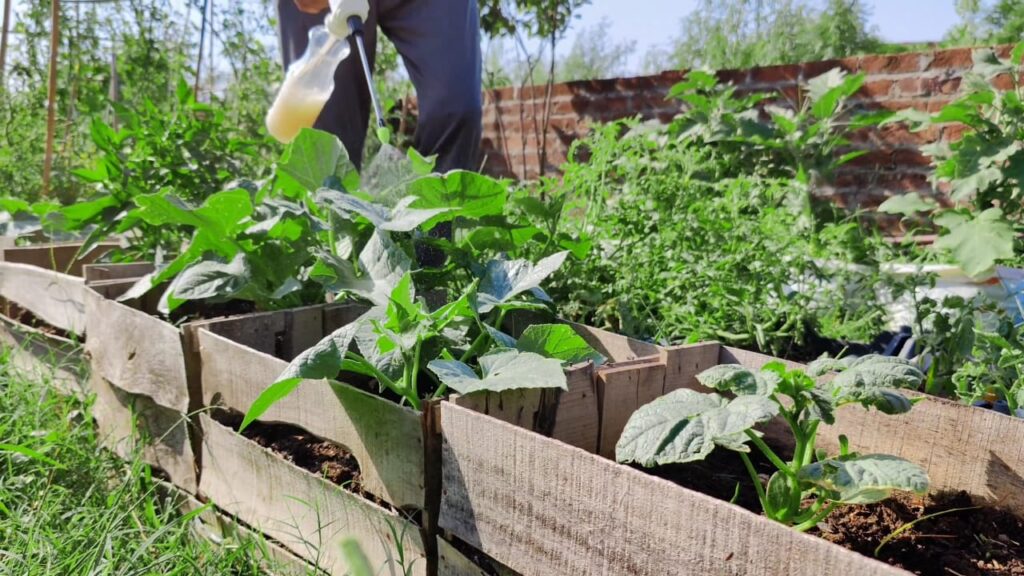
Your microbial solution will be usable in a few hours. Your garden can benefit greatly from the helpful microorganisms that have now been added to this enriched water. Make sure the water reaches the root zones by pouring the solution around the base of your plants. The bacteria in the solution will start to improve the soil’s overall structure, improve nutrient breakdown, and increase the availability of nutrients for your plants as they are absorbed into the soil. These microorganisms will gradually fortify your plants, increasing their resilience and yield.
Reuse Kitchen Waste to Make Your Garden Healthier
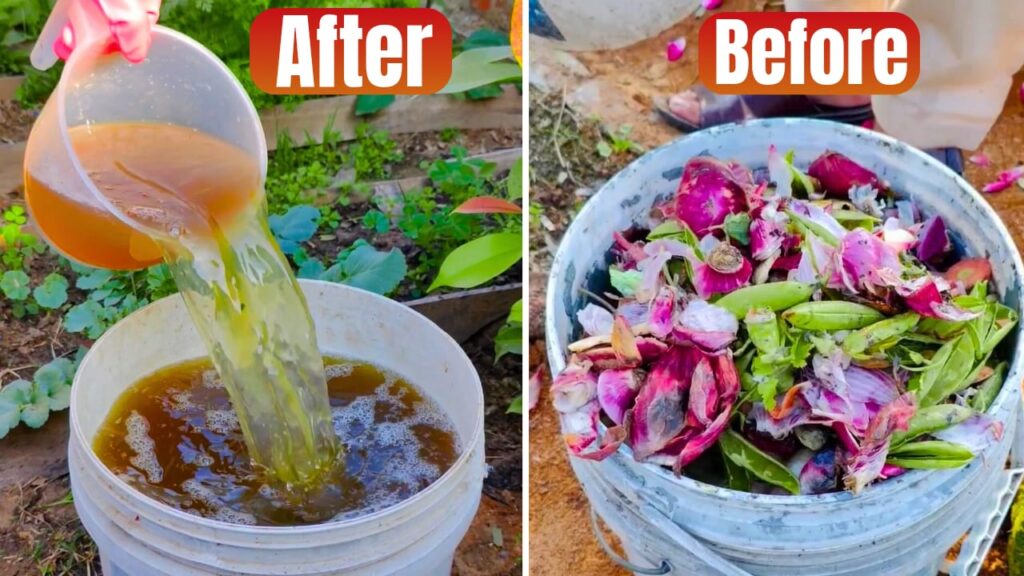
Recycling kitchen leftovers like fruit peels and vegetable scraps is another approach to improve your garden with helpful bacteria. When utilized appropriately, these materials can be excellent organic soil enrichers. You can use these culinary leftovers to make a microbial-rich compost or tea, much like you would with vegetable root germs. Just gather materials such as banana peels, apple cores, and carrot peels and put them in a bucket of water or a compost bin. By adding brown sugar and allowing the mixture to ferment, you can accelerate the breakdown process and further increase microbial activity. You can water your plants with the compost tea or fermented solution that results, which can improve soil health and provide your plants an extra boost of nutrients.
Create Microbial-Rich Compost from Garden Waste

Composting garden waste, such as leaves, grass clippings, and plant trimmings, is another excellent way to add helpful bacteria to your yard. By composting these wastes, you foster an environment that supports the growth of microorganisms. By converting organic matter into rich, nutrient-dense humus, these bacteria can enhance soil structure, hold onto moisture, and supply plants with the nutrients they need. To promote aerobic microbial activity and aerate the pile, think about rotating your compost on a regular basis. For extra protection and nourishment, you can use the completed compost as mulch around your plants or mix it into your garden beds.
The Advantages of Beneficial Soil Microbes
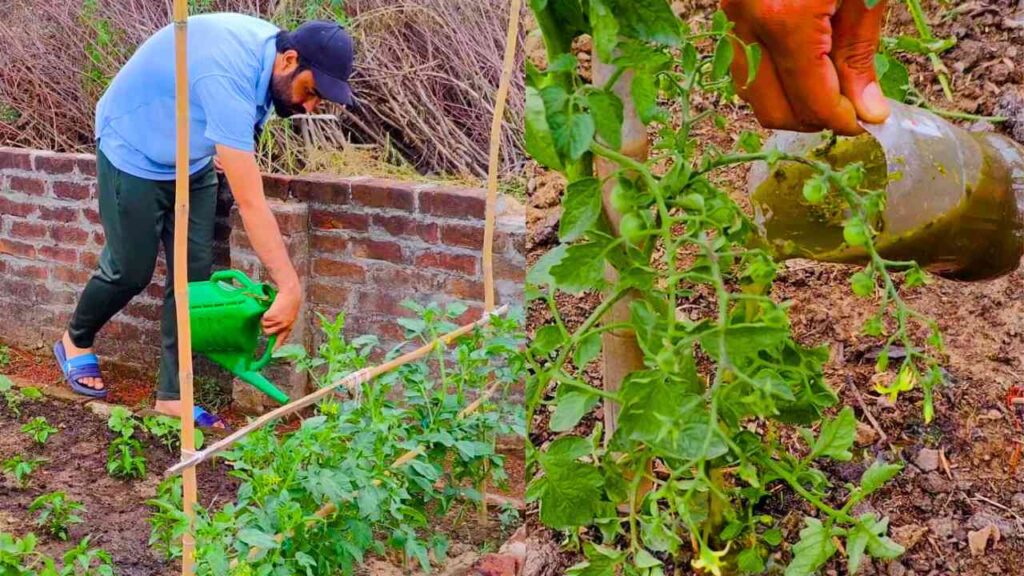
One of the secrets to successful gardening is keeping the population of soil bacteria in excellent condition. Through symbiotic connections with plant roots, these microorganisms—which include bacteria, fungi, and protozoa—play crucial roles in pest control, nutrient cycling, and even plant growth promotion. Beneficial microorganisms in healthy soil aid in the breakdown of organic matter, releasing nutrients for plants to absorb readily. By establishing pathways for air and water to reach plant roots and avoiding soil compaction, microbial activity also enhances soil structure. You may improve the general health of your soil and produce stronger, more fruitful plants by incorporating microbial solutions into your garden.
Incorporate Beneficial Microbes in Garden Maintenance

Long-term advantages can be obtained by routinely applying microbial solutions, such as compost tea or the one prepared from vegetable root-clinging microorganisms. The soil in your garden will improve with time, containing more active microorganisms that promote plant development. By outcompeting dangerous pathogens, these helpful microorganisms can lessen the need for chemical fertilizers and pesticides. Along with microbial solutions, other strategies to support the growth of beneficial microorganisms include crop rotation, soil pH maintenance, and adequate drainage. Your garden will remain robust and disease-resistant with regular upkeep and soil health monitoring.
Utilize Microbial Inoculants to Promote Plant Growth

You can buy microbial inoculants, which are commercial items that contain particular strains of helpful bacteria and fungus, if you want to further increase the growth of your plants. When beginning a new garden, planting in poor soil, or attempting to prevent soil-borne illnesses, these inoculants are very helpful. To guarantee that the bacteria reach the root zone, they can be added to watering systems or applied straight to the soil. By establishing a robust foundation of advantageous microorganisms in the soil, microbial inoculants can help plants develop more robustly and more successfully withstand stress, disease, and pests.
Promote a Sustainable Garden Ecosystem
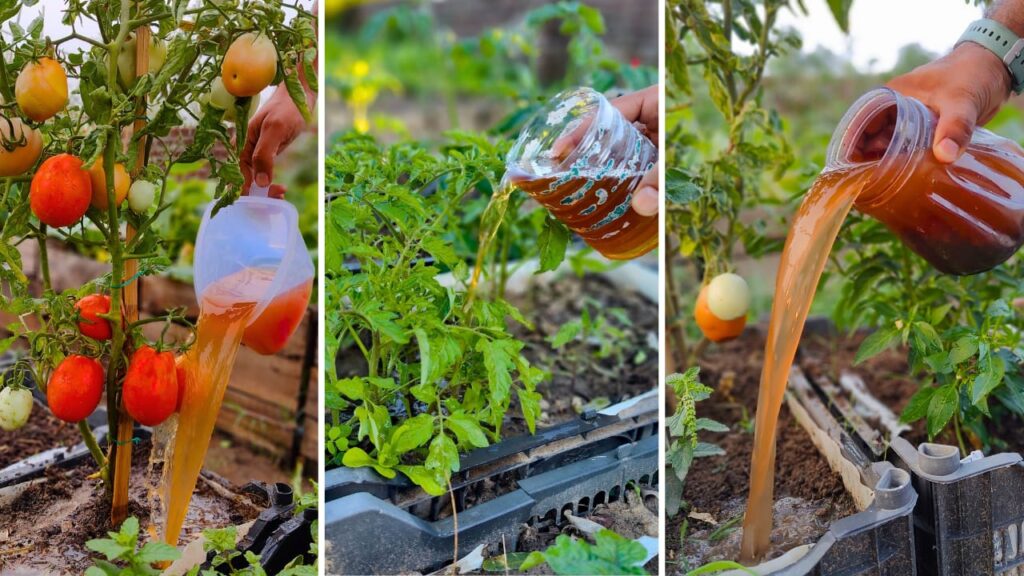
A more sustainable garden ecology can be achieved by including microbes in your gardening techniques. You can lessen your environmental impact by depending on natural microbial activities to increase soil fertility and lessen the demand for chemical inputs. In addition to promoting plant growth, this sustainable method preserves resources, lowers pollution, and promotes biodiversity. Promoting microbiological health in your garden benefits the surrounding ecosystem as well as the overall environmental health of your garden area.
Conclusion: Maximizing Your Vegetables’ Hidden Potential
We can achieve a whole new level of gardening success by realizing the hidden potential in the soil and bacteria that cling to our veggies. Instead of throwing away this precious resource, we can use it to improve the condition of our soil and feed our plants. Making this minor adjustment to your vegetable cleaning regimen can have a significant impact on your garden’s vigor and productivity. Please visit our site for further gardening tips and ideas if you found this material useful.
